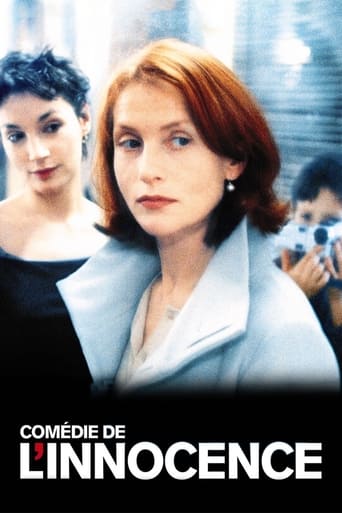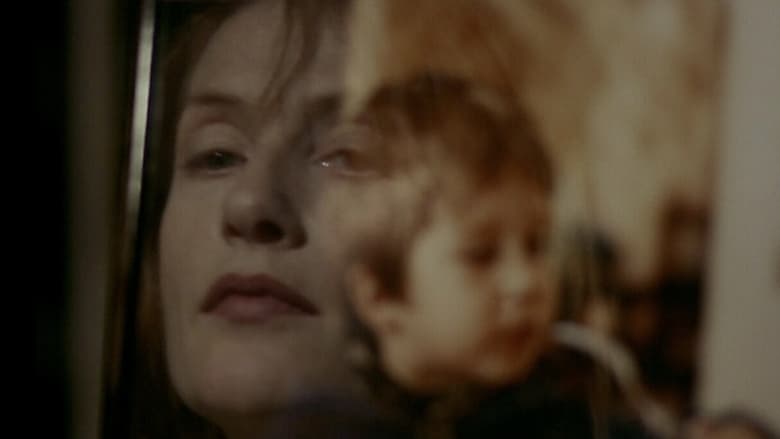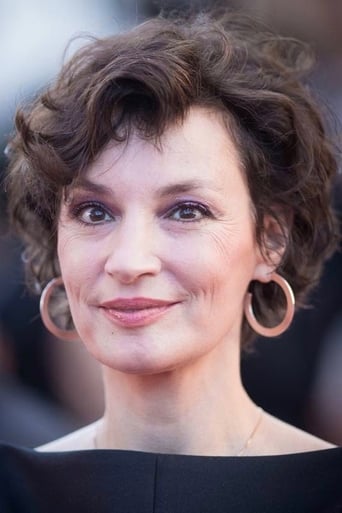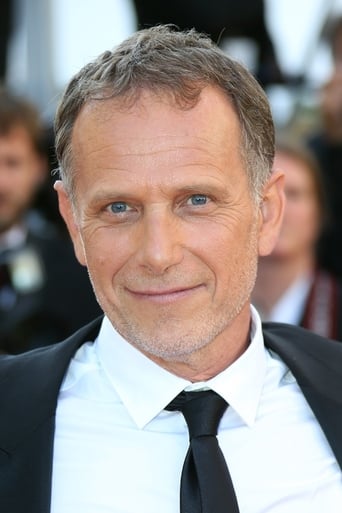Comedy of Innocence (2000)
Today, Camille turns nine. He had sworn that on his 9th birthday he would show his parents the videos he was shooting on the side - the tail of a cat scampering away, a window, and a veiled woman's face - an intriguing picture... Later that day, Camille's mother, Ariane, meets up with her son in the park. The boy appears perturbed. He is leaning against a tree, eyes cast down. He says that now he wants to return to his "real home" and his "real mother."
Watch Trailer
Free Trial Channels
Cast


Reviews
How wonderful it is to see this fine actress carry a film and carry it so beautifully.
I wanted to like it more than I actually did... But much of the humor totally escaped me and I walked out only mildly impressed.
It is interesting even when nothing much happens, which is for most of its 3-hour running time. Read full review
It is neither dumb nor smart enough to be fun, and spends way too much time with its boring human characters.
This is extraordinary. It's an easy movie to either like or dislike, because after watching it once, you might realize, or not realize that from almost the first scene, as the characters fade back and forth from real to incredible, you and one of the characters are being fooled into believing that something is real that doesn't actually exist. The two 'mothers' are one-of-a-kind beauties, and the child, Camille is played by a fabulous once-in-a-decade child actor. If you pay attention to the closeup of the painting at the end, you will become fully aware how our cine-reality has been compromised during the time we were watching. I was moved to order the book, now a set retitled, "Separations: Two Novels of Mothers and Children".
The recently deceased Raoul Ruiz was certainly an extremely idiosyncratic director, whose films did not look like anyone else's. Sometimes his experiments could go disastrously wrong ("That Day"), but other times they were fascinating to follow ("Shattered Image"). I think "Comedy Of Innocence" comes closer to the second category. I like this film....but don't ask me to tell you why! Ruiz comes close to doing for cinema what the "abstract painters" did for their art; he fills the screen with "unexplainable" (as even he himself admits) details (e.g., the rolling dice that always comes out the same) that somehow work even if you don't understand their meaning. In the meantime, the main story of "Comedy Of Innocence" is actually quite straightforward, if you pay attention to it; that doesn't mean it's not extremely weird, though! Both female leads give exceptional performances, but extra praise must go to the little boy - undeniably one of the best child performances of the last decade at least. Watch this film when you're in the mood for something you can't quite describe with words. *** out of 4.
The late director Raul Ruiz has declared that what interested him when making films was the middle ground between traditional narrative and experimentalism. His movie The Comedy of Innocence (2000) is based in a novel by futurist writer Massimo Bontempelli, The Boy with Two Mothers, and recreates as in an unstoppable nightmare the archetypal fantasy of the child that imagines that his parents are not the real ones. The family lives in a strange Parisian house besieged by the remembrance of a dead incestuous eternal grandfather. The father is frequently absent, and the mother- theater designer- is suddenly refused as such by his nine years old unique son. Another mother, the ideal one that in fantasy every child wants to possess, will appear "really" in the world of the movie and in the video that the child shoots in that world. He harasses alternatively the two mothers with his camera. On his side, the director, perversely too, plays the same game with the spectators, moving the camera menacingly. We are introduced into two houses abundant in statues, paintings, mirrors, that duplicate "reality", and revive in us the ancestral fear before images of resemblance (those obvious elements of cinema) and some inanimate objects that seem to earn life. Ruiz has said in an interview that all his features, and he shot dozens of them, have "film" as their theme. The child uses the camera not only for reproducing but for torturing, and the mothers are ready to collaborate providing that the child will choose just one of them ( see the last scene, for instance). The need of possession and the anguish of abandonment succeed in impregnating each one of the characters, driving them to incredible behavior. The supposed legitimate mother (if there is a legitimate identity in the world of this movie) not only tries to recuperate her son, but to become even the fantasized mother. Ruiz plays convincingly with the impossible until a denouement that dubiously gives resolution to mystery. Like the young nanny who when throwing the dice gets the same results, the picture doesn't cease astonishing the viewers.
On the face of it, Ruiz has set out to make a psychological thriller. Although it's not as satisfying as a classic piece in that genre, there are compensations. The tensions generated between Huppert and Balibar as women calmly but calculatingly at war over a boy they both claim are compelling; however, in a true European art-house style, Ruiz doesn't give us release of this tension as the women alternately also try to behave compassionately towards each other. The only raised voice is that of Huppert's waking from a nightmare (an uncontested irrational event in the film).In fact, if we follow the title, the film is as little about its thriller skeleton as Jane Campion's In The Cut. Instead it is an intergender psychological study focusing on men. The boy, Camille (Nils Hugon), decides on a practical joke, playing his mother off against an emotionally vulnerable other woman. Both women seem to pander to him rather than scold and this compounds the problem. In the background is an intemperate psychologist (Charles Berling), swift to confront the women in his life - his sister Huppert, the nanny or his pa - and so acting as a symbolic adult counterbalance to the, calm and (we learn) manipulative Camille. It is particularly interesting that, like the father in Henry James' The Turn of The Screw, Denis Podalydes' law-enforcer Father is absent for the duration of the film. Ruiz fashions an Oedipal moment out of Huppert's reaction to his return at the film's close.Read either as a thriller or as a psychiatric essay, this film is ultimately rather disappointing. I'm officially rather fed up with Mme Huppert's screen method, which is too buried and so I'll be looking to see her on stage before I come back to her (European - enjoyed Heaven's Gate) films again. The support is good. Ruiz does the cast no favours though. Quite apart from some poor lighting and some wilfully odd shots, its as if his direction has left characterisation quite out of reach - I'm thinking particularly of Edith Scob's Shamanic neighbour to Isabelle, who acts knowing but communicates bafflement. The set pieces do not link up to a forward driving plot - the tension I have already referred to is not only weakly dissipated but wasted in its directional potential.Want to see a good contemporary French thriller? Go and see L'Appartement instead. 4/10








